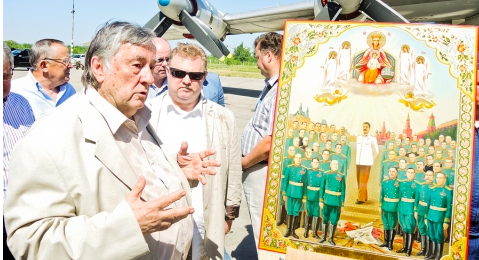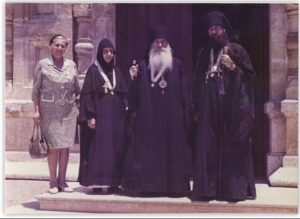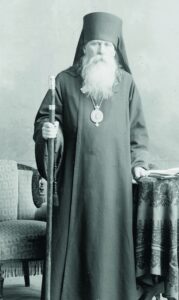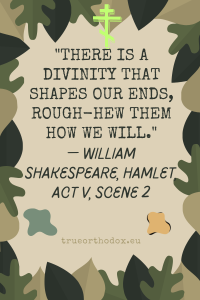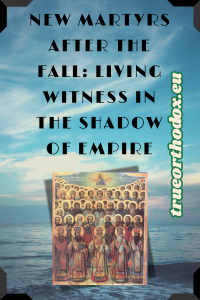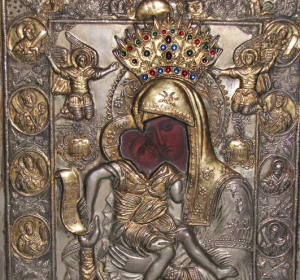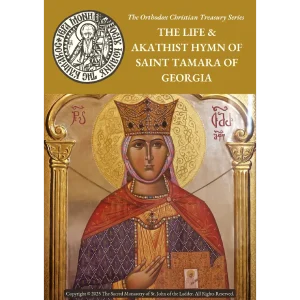The Church Cult of Stalin
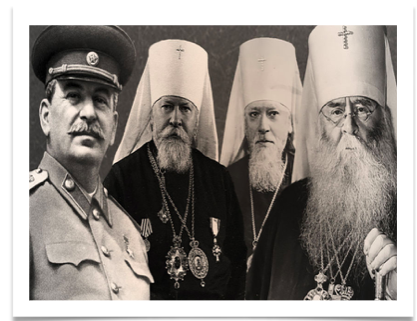
by Dr. Vladimir Moss
In his secret speech to the Communist Party in 1956, Khrushchev denounced Stalin’s “personality cult”. Unfortunately, the Russian Orthodox Church of the Moscow Patriarchate (ROC-MP) heeded this warning little, although in all other respects it was subordinate to the Communist Party. Let’s look at the stages of this church worship.
At least since the Second World War, the MP has not ceased to glorify Stalin in the most shameful way, truly becoming the “Soviet Church,” the State Church of the Bolshevik regime. The cult of Stalin, perhaps the greatest persecutor in Church history, has reached idolatrous proportions. He was the “defender of the Church,” “the new Constantine,” “the genius of geniuses.” The first issues of the Journal of the Moscow Patriarchate were filled with magnificent praises of the “God-given Supreme Leader”. Yet Stalin never changed his core hostility to the Church. In 1947 he wrote to Suslov: “Do not forget about the atheistic propaganda among the people.” And the bloodshed in the camps continued …
Together with the cult of Stalin came an enthusiastic acceptance of the communist ideology and a conscious refusal to contemplate the enormous scale of its blasphemy and cruelty. So, immediately after the war, the MP spoke as follows about the elections to the Supreme Soviet of the USSR: “On this day, in all cathedrals, churches and monasteries of our country, a bloodless Sacrifice will be made, the beginning of which was laid by the One Who brought the ideas of love, justice and equality to the world … Deeply moved ministers of the church will go to the pulpits and bless their children to hurry out of the churches to the ballot boxes. They will bless them to cast their votes for the candidates of the communist bloc … They themselves will cast their votes … The ideal of such a person is Stalin … “
However, the apotheosis of the cult of Stalin at the Moscow Patriarchate fell on his birthday in 1949, when “Greetings to the Leader of the Peoples of the USSR” was addressed to him on behalf of the entire Church.
“Without the slightest hesitation,” writes Fr. Gleb Yakunin and a group of Orthodox Christians: “We can call this appeal the most shameful document ever drawn up on behalf of the Church in the entire history of Christianity, and even more so for the thousand-year history of Christianity in Russia.”
Both the ROCOR and the Catacomb Church condemned the cult of Stalin in the MP. Thus, in response to the MP’s description of Stalin as “the chosen one of the Lord, leading our country to prosperity and glory,” Metropolitan Anastassy, First Hierarch of the ROCOR, wrote that this was the moment “when a person’s servility already borders on blasphemy.” Indeed – is it possible to put up with the fact that a person, stained with blood from head to foot, covered with crimes like leprosy, and deeply poisoned by the poison of atheism, should be called “the chosen Lord” who may be destined to lead our homeland “to prosperity and glory” ? Isn’t this tantamount to slander and insult to the Most High God Himself, Who in that case would be responsible for all the evil that has been happening on our land for many years, ruled by the Bolsheviks led by Stalin? The atomic bomb and all other destructive means invented by modern technologies are really less dangerous than the moral decay, which the highest representatives of civil and church authorities put into the Russian soul by their example. The destruction of the atom brings with it only physical devastation and destruction, while the decay of the mind, heart and will entails the spiritual death of an entire people, after which there is no resurrection. “
On March 5, 1953, Stalin was dying. “His face was discolored,” wrote his daughter Svetlana, “his features became unrecognizable … He literally choked to death as we watched. The death throes were terrible … At the last minute, he opened his eyes. It was a terrible look, either insane or angry, and full of fear of death. “
“Suddenly,” continues Simon Sebag Montefiore, “the rhythm of his breathing changed. The nurse thought it was “like a greeting.” He “seemed to be either pointing upwards or threatening us all …” – Svetlana noted. Most likely, he was just gasping for air in search of oxygen [or pointing to demons coming for his soul]. “Then the next moment his spirit, after the last effort, broke away from his body.” The woman doctor burst into tears and hugged the devastated Svetlana … “
And that was the tragedy for Russia and the whole world: so many people still loved this most evil of people. For in the following days, millions of people poured into Moscow to mourn the destroyer of their country and their Church. The hysteria was so great that hundreds of people were crushed to death. Their grief was sincere – and therefore the punishment of the earth continued. To this day, God’s anger over the Russian land does not subside …
Chingiz Aitmatov tells the following story in a partial explanation: Stalin gathered the council of the Central Committee and told how to deal with the people. They brought him a live chicken. Stalin plucked her alive before the eyes of the Central Committee. Straight to the skin, all the way, until only the comb is left on her head. “Now look,” he said, and released the chicken. He left the hall, the chicken ran after him. Then he said, “See, now the chicken is too hot in the sun and too cold in the shade.” The poor bird could only snuggle up to Stalin’s boots. And then he tossed her a handful of grain, and the bird followed him wherever he went. That was the story. Otherwise, she would have starved to death. “Like this,” he said to his disciples, “you can rule our people.”
Of course, there were many around the world who made a good career with Stalinism, who may not have liked him, but were not inclined to rejoice at his death. One of these was the famous German playwright Bertolt Brecht, who, as Paul Johnson writes, “always and often publicly supported all of Stalin’s policies, including his artistic ones … When Stalin finally died, Brecht commented:“ The oppressed of all five continents … must maybe they felt their heartbeat stop when they heard that Stalin was dead. He was the embodiment of their hopes. ” In 1955, he was delighted to receive the Stalin Peace Prize. Most of the 160,000 rubles went directly to his Swiss account. And he went to Moscow to get it, and asked Boris Pasternak, apparently unaware of his vulnerable position, translate his opening speech. Pasternak was happy to do this, but later (the prize was renamed in the meantime) ignored Brecht’s request to translate several of his poems in honor of Lenin. Brecht was alarmed by the spread of Khrushchev’s secret speech at the meeting on Stalin’s crimes and strongly opposed its publication. He explained his reasoning to one of his students: “I have a horse. She is limp, shabby, and squinting. Someone comes up and says: but the horse is mowing, it is limping and, look here, it is lousy. He’s right, but what do I care about that? I have no other horse. Do not have another one. I think it’s best to think as little as possible about its shortcomings … “” Brecht was alarmed by the spread of Khrushchev’s secret speech at the meeting on Stalin’s crimes and strongly opposed its publication. He explained his reasoning to one of his students: “I have a horse. She is limp, shabby, and squinting. Someone comes up and says: but the horse is mowing, it is limping and, look here, it is lousy. He’s right, but what do I care about that? I have no other horse. Do not have another one. I think it’s best to think as little as possible about its shortcomings … “” Brecht was alarmed by the spread of Khrushchev’s secret speech at the meeting on Stalin’s crimes and strongly opposed its publication. He explained his reasoning to one of his students: “I have a horse. She is limp, shabby, and squinting. Someone comes up and says: but the horse is mowing, it is limping and, look here, it is lousy. He’s right, but what do I care about that? I have no other horse. Do not have another one. I think it’s best to think as little as possible about its shortcomings … “” but what do I care about that? I have no other horse. Do not have another one. I think it’s best to think as little as possible about its shortcomings … “” but what do I care about that? I have no other horse. Do not have another one. I think it’s best to think as little as possible about its shortcomings … “”
One of the few who did not mourn Stalin’s death was Lavrenty Beria, a terrible Georgian executioner and head of the special services. He may have killed Stalin, perhaps to save himself (Stalin began to suspect that he was a Jew). According to Molotov, Beria actually said: “I am done with him, I saved you all.” Of course, he openly rejoiced at Stalin’s death, while even Molotov, whose beloved wife Polina was still in prison when Stalin died, sincerely mourned him. Ironically, Beria may have been the only satrap who didn’t really believe in communism – after all, he wanted his grandchildren to attend Oxford University! (If he wanted them to deepen their knowledge of Marxism, he would have preferred Cambridge University, the main nest of Stalin’s spies, or the London School of Economics.)
The Moscow Patriarchate was completely different: it did not weaken its worship of Stalin even after his death. Thus, on March 10, 1953, Izvestia published a letter from Patriarch Alexy to the USSR Council of Ministers: “On my own behalf and on behalf of the Russian Orthodox Church, I express my deepest and sincere condolences in connection with the death of the unforgettable Joseph Vissarionovich Stalin, the great builder of people’s happiness. His death is a heavy grief for our Fatherland and all the peoples inhabiting it. His death was received with deep sorrow by the entire Russian Orthodox Church, which will never forget his benevolent attitude to the needs of the Church. His bright memory will never be blotted out from our hearts. Our Church sings to him “eternal memory” with a special feeling of unceasing love. “
In very sharp contrast, the Synod of Bishops of the ROCOR declared: “The death of Stalin is the death of the greatest persecutor of the faith of Christ in history. The crimes of Nero, Diocletian, Julian the Apostate and other villains pale in the face of his terrible deeds. No one can compare with him either in the number of his victims, or in his cruelty towards them, or in his cunning in achieving his goals. It seemed that all satanic evil was embodied in this man, and that he, even more than the Pharisees, deserves the title of the son of the devil. “
Marxism-Leninism went out of fashion after the collapse of the Soviet Union in 1991. But the communist spirit never died: by the end of the liberal era of the 1990s, it was reborn in the form of “National Bolshevism,” an extreme nationalist form of old communism with the addition of some “orthodoxy,” but without Marxism. This modernized form of the old ideology sought to justify the Soviet past in all its unprecedented evils and rejected repentance for its sins as a betrayal of the nation.
This was most vividly illustrated in an article entitled “The Religion of Victory”, in which the new Russian religious-political bloc “For Victory!” presented his program. The victory in question was the victory of the Soviet troops over Nazi Germany in 1945, whose blood, according to the bloc, had a “mystical, sacred meaning”, being “the main emblem of Russian historical consciousness”. The political and economic aspects of the bloc’s program were communist, but its nationalist and religious aspects were even more troubling. Yeltsin and his colleagues were accused of betraying the 45th year and the “truly brilliant” achievements of post-war Sovietism.
“The enemy [which is clearly the West],” wrote Valentin Chikin, “failed to destroy our Victory. Victory is the spiritual strength that will help us to be reborn. From Victory, as from a fruitful tree, new technologies will grow, new schools will grow, the defense will be strengthened, a worldview will be developed. And the new community, embracing the entire nation, will confirm the Victory of 1945 in the 21st century. “
Alexander Prokhanov
“Let’s not forget: in the forties, an amazing merger of Russian eras took place. Pagan, with Prince Svyatoslav [‘damned’, as the Orthodox Church calls him], who fought off the Khazars. Orthodox, in which the great Russian commanders and saints acted – Alexander Nevsky and Dmitry Donskoy. Monarchist with Peter, Suvorov, Kutuzov. In the smoke of the battles of the Patriotic War, they were combined with the brilliant “reds” Zhukov, Vasilevsky, Rokossovsky, about which Joseph Stalin announced so clearly and loudly from the Mausoleum. … Only the For Victory bloc has the right to claim the breadth of the entire nation. The ideology of the “For Victory!” Bloc – this is a long-awaited national idea … Victory is also that sacred word that fills the Russian heart with pride and freedom. “
Alexander Prokhanov continued the theme: “Victory is not just a national idea. Victory is a creed, a special religious mentality of Russians. An Orthodox, a Muslim, an atheist, and a passionate believer will find a place under the dome of Victory. Of course, in order to reveal this doctrine, you need your own heralds, such as John the Theologian. We need our own builders and organizers. In the creation of this religious philosophy there is a place for artists and sculptors, sociologists and political scientists, historians and politicians. “
“We have yet to build this great Russian doctrine – Victory! In it, for centuries, a miracle that was expected from the Magi, passed from mouth to mouth, from Kievan Rus to the Moscow principality, from the empire of tsars to the red empire of leaders. This is the hope for universal good, for universal love. Understanding that the world is ruled not by blind forces of matter, but by Justice, Divine truth … “
Orthodox authors rushed to support this ideology. Movements arose for the canonization of such “strong leaders” as Ivan the Terrible and Rasputin. Stalin’s “icons” appeared. And, what is most terrible and blasphemous, the anniversary of the Soviet victory on May 9, 1945, was presented by some as a “holiday of the holidays”, comparable to Easter – and even as Easter itself! So, in an article on the patriarchal website, we read:
Dmitry Dudko
The “godless” USSR, trampling death on death, resurrected and saved the world. Just because the “godly” and “godless” soldiers died in millions, we live today and the entire world population, all mankind is alive. And it will not be an exaggeration to believe that that terrible and Great War and the Great Victory in that Great War became the first sociologically large-scale world resurrection, the reproduction of the heroic deeds of Christ by the peoples of the USSR. This fact requires a general understanding and non-calendar attitude to holidays, since any holiday is always based on an event, not a date. May 9, 1945 became the most convincing evidence that two thousand years ago Christ was resurrected. Therefore, our Great Victory is a holiday of holidays, this is Easter. “
Former idol of the ROCOR liberals, Fr. Dimitri Dudko wrote: “Now the time has come to rehabilitate Stalin. However, not only his, but the very concept of statehood. Today we ourselves can see with our own eyes what a crime is statelessness and what a blessing – statehood! No matter how they shout that in Soviet times, many died in the camps, but how many are dying now without trial and investigation, with impunity, without knowing, that death cannot be compared. All the robbed and deceived people are now sighing: if only Stalin had been, there would have been no such devastation.
From the outside, Stalin is an atheist, but in fact he is a believer, this could be shown on facts, if not for the scope of our article. It is no coincidence that the Russian Orthodox Church sang to him, when he died, even eternal memory … But the most important thing is that Stalin took care of Russia in a fatherly way. And therefore Stalin, at least for me, legally stands next to Suvorov … “
“Church Stalinism” in the Moscow Patriarchate, even now, when it has found itself free from Soviet pressure, has become the most terrible sign of lack of repentance. In 2010, this impenitence became the official ideology of the Moscow Patriarchate. Its new leader, Patriarch Kirill, said that “we must be imbued with a special understanding of the cleansing meaning of the Great Patriotic War – and this is a religious understanding.”
Cyril blames those historians who believe that the evil on the Soviet side was no less than on the side of the Nazis: with their “primitive and sinful analysis,” he says, they do not see a “Divine perspective.” According to the patriarch, Russia was spiritually reborn in 1945 thanks to the shed blood of millions of Soviet citizens who died in the war. Therefore, we must solemnly celebrate May 9 as a church holiday.
Consider what actually happened in the war, and in the period before and after it.
Time from 1917 to 1941 was the most ruthless, massive, bloody and destructive persecution of the Orthodox Church throughout its history. To point out only the horrific statistics: according to Russian government sources, 136,900 priests were arrested in 1937 alone, of whom 106,800 were killed. Along with the destruction of its own citizens on an unprecedented scale, the Soviet Union signed a pact with Nazi Germany and, with its “blessing”, annexed part of Poland and the Baltic states to its territory.
The Nazi attack on the Day of All Saints Who Shone in the Land of Russia liberated western Russia from Soviet oppression and was greeted with undisguised enthusiasm by most of the inhabitants. Collective farms were dissolved (slave labor camps in everything except the name), churches were opened, and many people were baptized. The legitimate church hierarchy was restored in the form of the Autonomous Orthodox Churches of Ukraine and Belarus, which joined the ROCOR in 1946.
However, for those who remained on Soviet territory, events developed differently. The persecution of Christians, especially the Catacombniks, who refused to recognize Soviet power and fight for the “achievements of October”, did not stop. Many were killed for refusing to serve in the Red Army, thousands were sent to camps.
Moreover, despite all the attempts of Soviet propagandists to present the war as “the Great Patriotic War”, it did not produce any revival of Russian patriotism. As Anton Kuznetsov writes, “from the very beginning the Bolsheviks showed themselves as an anti-Russian government, for which the concepts of Motherland, Fatherland, honor and duty do not exist; in which the shrines of the Russian people evoke hatred; which replaced the word Russia with the word International, and the Russian national flag with a red banner; which, in terms of its ethnic composition, was obviously non-Russian: it was dominated by Jews (constituting a huge%, at first it seemed that it was a purely “Jewish power”) and foreigners.
During the 24 years of its rule, the Bolshevik (“Soviet”) power has achieved tremendous success in the destruction of historical Russia. All estates were successively exterminated: the nobility, merchants, peasants, clergy, the educated stratum (including all the Russian officers) and all state institutions of former Russia were destroyed: the army, police, courts, local government, charitable institutions, etc. A systematic destruction of Russian culture was carried out – churches were blown up, museums were plundered, cities and streets were renamed, Russian family and everyday traditions were erased, Russian science and school were liquidated, the entire Russian history was crossed out and spat upon. Instead of the destroyed Russian, red and Soviet were created, ranging from the Red Army and the red professors and ending with Soviet spelling and Soviet sports. Our earthly Fatherland – Russia was actually destroyed, it was turned by terror and turned into the Council of Deputies, which was a complete denial of Russia, anti-Russia. The Russian person has no right to forget that the consistent denial of the Russian statehood is what the Soviet regime stood on and what it emphatically boasted about.
Such a regime has no right to be called a national power. It should be defined as an anti-national occupation power, the overthrow of which every honest patriot can only welcome.
… The anti-national and anti-people essence of the Red (Soviet) Army is clear to everyone who has more or less close contact with this army.
But every Russian who has preserved his national memory will agree that the Workers ‘and Peasants’ Red Army (RKKA) has never been either the continuer of traditions or the legal successor of the Russian Imperial Army (such was and remains to this day the White Army). The Red Army was created by the Bolsheviks instead of the Russian Army destroyed by them, and the creators, leaders and backbone of the personnel of this army were either open traitors to the Motherland, or traitors to the oath and deserters from the Russian Army. During the Civil War, this army dishonored itself with looting, the murders of our Russian officers and generals, and unheard-of violence against the Russian people. At its creation, it was replenished with criminal rabble, village tramps, Red Guards, sailors, as well as Chinese, Magyars, Latvians and other “internationalists”. In the “command staff” of the Red Army, the communists were: in 1920 – 10.5%; in 1925 – 40.8%, in 1930 – 52%, and from the end of the 30s all command positions were occupied by communists or Komsomol members. This army was saturated with informers from the NKVD and political instructors, its fate was decided by commissars, most of whom were Jews; it was not a national Army, but a party army of the All-Union Communist Party of the Soviet Union (Bolsheviks) -KPSU. The slogan of this army was not “For Faith, Tsar and Fatherland!”, But “Give me the International!”
This army was originally created not to defend, but to enslave our Fatherland and turn it into a “springboard for the world revolution”, from which it was supposed to wage an offensive war for the spread of theomachy communism throughout the world …
But of course the most terrible blow to this myth is dealt by the Russian Liberation Movement of the Second World War, which Soviet patriots call “Vlasov”. The very fact that about 1,000,000 (one million!) Soviet citizens served as part of the German Wehrmacht at different times should suppress all talk about the “Great Patriotic War”, because really: where, when, during what Patriotic War people in so many voluntarily go over to the side of the enemy and fight in his ranks? The Soviet patriots do not find anything smarter than to declare these people innate traitors, self-seekers and cowards. This is a blatant lie, but even if it were true, it remains completely incomprehensible why before in its entire history Russia did not know such a massive “betrayal” and such a large-scale “betrayal”. How many wars has Russia fought and we have never had so many traitors, defectors and “self-seekers”, but as soon as the “patriotic” war began, and moreover, not a simple one, but a “great” one, hundreds of thousands of people with arms in their hands went over to the enemy’s side. Moreover, people registered in the ROA even in 1945, when the collapse of Nazi Germany became obvious, and Stalin’s victory was inevitable. “
When the Bolsheviks retreated in 1941, “the NKVD carried out a program to eliminate all prisoners who were in its dungeons. In the large Lukyanovskaya prison in Kiev, thousands were shot in their cells. But in Stavropol they still managed to take the “counter-revolutionaries”, including the old priests and monks, out of the city. A “special train” of prisoners from the regional city of Stavropol arrived on the Moscow-Kislovodsk line. At the Mashuk station, the place of M. Yu. Lermontov’s duel, the cars were uncoupled and brought to a dead end, to the Quarry. Priests and monks had their hands tied and blindfolded. In fives they were taken to a deep steep cliff forming a huge pit of the quarry and, with the assistance of soldiers, they flew down from a great height. Then the lifeless ones were dragged away with hooks and all the following fives were laid in rows. Then they threw the earth
The Germans were greeted with great joy. Alexander Solzhenitsyn writes: “Lithuania, Latvia and Estonia arranged a solemn meeting for the Germans. Belarus, Western Ukraine and the first occupied Russian territories followed suit. But most clearly the disposition of the people’s spirit was demonstrated by the Red Army: in front of the whole world, it retreated along the entire 2000-kilometer front, on foot, but at the same speed as motorized formations. Nothing could be more convincing than how these people, soldiers represented by their best representatives, voted with their feet. The numerical superiority was entirely on the side of the Red Army, it had excellent artillery and strong tank units, which, however, were rolling backwards – an incomparable defeat, unprecedented in the annals of Russian and world history.
That is, the mood of the people was similar – the mood of those peoples, some of which survived twenty-four years of communism, and those that only one year. For them, the whole point of this last war was to throw off the yoke of communism. It is quite natural that each nation was primarily interested not in solving any European problems, but in its own national task – liberation from communism. “
“During the war years,” writes Anatoly Krasikov, “with the consent of the German occupation authorities, 7,547 Orthodox churches were opened (versus 1,270 opened in 1944-1947 with the permission of the Council for the Affairs of the Russian Orthodox Church).” Even in fully Sovietized regions such as Pskov or eastern Ukraine, 95% of the population, according to German sources, poured into open churches.
However, German stupidity and racial hatred towards the Slavs led to the fact that by the end of the war, many Russians were happy with the withdrawal of the German troops. In addition, Nazism and Sovietism were close in spirit and ideology as two branches of the same anti-Christian revolution. So the war between them was by no means a war between good and evil, even in a relative sense, but rather a war between two demonic regimes.
And the bigger demon won … As the Red Army advanced westward in the final months of the war, one of the greatest exoduses in human history began. Millions of people of different nationalities fled from the apocalyptic beast – especially the Russians, who knew exactly what the return of Soviet power would lead to. Among them were the entire hierarchy of the Belarusian and Ukrainian Autonomous Churches, along with many future lamps of the Russian Church Abroad, such as Metropolitan Vitaly, Archbishops Vitaly and Averky, Leonty of Chile and Andrei Rockland …
The behavior of the Red Army soldiers on German soil was incredibly brutal. It was apologized by the Soviet propagandists that it was natural for the soldiers to take revenge on the Germans for their crimes in Russia. But such an argument may be meaningful for pagans or communists, but not for Christians, let alone Orthodox.
The most affected part of the German population was women. According to Richard Evans, professor emeritus of modern history at the University of Cambridge, “women and girls were subjected to constant violence … Violence was often accompanied by torture and bullying and ended in murder. Often, especially in Berlin, women were raped in the presence of German men in order to accentuate the mockery. The men were usually killed because they tried to prevent the violence. In East Prussia, Pomerania and Silesia, about 1,400,000 women were raped. Violence was the norm rather than the exception. The two largest Berlin hospitals estimate that at least about 100,000 women have been raped in the German capital. Many fell ill with sexually transmitted diseases. A large number later had abortions, or, if given birth, left the children in the hospital. The violence continued for many weeks, even after the formal end of the war … German women learned to hide, especially after dark; or, if they were young, take a Soviet soldier, preferably an officer, as a lover and protector … “
Thus, according to Patriarch Kirill, the valiant Christian soldiers of the Red Army “atoned for the sins of the Russian people”! Thus, Stalin “trampled death on death”! Thus, Christ was glorified in the new Passover!
But no: the results of the war were irreparable harm for all people who fell into the sphere of Soviet rule – and even for those who found themselves outside it, since Stalin forced the allies to forcibly surrender millions of Russians in accordance with the Yalta agreements.
“From 1945 to 1947. 2,272,000 people were transferred by the Allies to the USSR. Of these, over 600,000 served in the “eastern forces” of the German army. About 200,000 were able to stay in the West. ” However, as Vitaly Shumilo writes, “more than 6,000,000” eastern workers “(skeleton), refugees and emigrants were forcibly repatriated to the USSR until 1948. Most of them ended up within the walls of the Stalinist NKVD.”
The largest category of those who were forcibly repatriated were those who fought in the Red Army. Already during the war, the authorities executed 157,000 Red Army soldiers (the equivalent of 50 divisions) and almost a million were arrested. Then it was the turn of those who spent the war in the Nazi camps, or simply, having seen the prosperity in the West, learned about the falsity of Soviet propaganda. Archpriest Mikhail Ardov writes: “I perfectly remember the post-war years, how in 1945 and 46 Moscow was literally flooded with crippled, armless, legless soldiers who came from the war, and suddenly they all disappeared. I only later found out that all of them, so that they would not spoil the view of the capital, were seized and sent to die on the island of Valaam.
There was no monastery, there they are, one can imagine the conditions in which they lived out their days. They were begging, begging, – so that nothing of this was in the capital, so they were treated. I remember this well. In addition, as we know, due to the fault, in general, of Stalin himself, his military leaders, a huge number of Soviet people were taken prisoner. And the state immediately renounced them, they were immediately declared traitors. And later, when they returned to our country for one reason or another, they were immediately – for the most part – simply imprisoned in Stalin’s camps. This is how they treated the veterans … “
In 1945 specially selected bishops from among the most cowardly were forced to choose Alexy (Simansky) as patriarch and to agree with the unprecedented control of the state over the Church. Vitaly Shumilo writes: “The external result of the 1945 Moscow Cathedral was favorable for the Soviet regime, in fact, due to the fact that the participation of the Eastern patriarchs in it gave“ legitimacy ”and“ canonicity ”for the Stalin-inspired elections. This misled not only a part of the Orthodox hierarchy abroad, but also many true Orthodox pastors in the USSR, who naively did not suspect that this could have happened with canonical violations. “
The decisions of the council had direct and extremely unpleasant consequences for those Orthodox Christians who remained faithful to Christ. As Professor Ivan Andreev, who was a member of the Catacomb Church before the war, writes, “The underground or Catacomb Church in Soviet Russia was subjected to severe persecution after February 4, 1945, when the enthronement of Soviet Patriarch Alexy took place. Those who did not recognize him were sentenced to new terms of imprisonment and killed some time later. Those who recognized him were often released before the end of their term and appointment … All secret priests discovered in the Soviet zone in Germany were killed. ” This fact, as M.V. Shkarovsky, “partially confirmed by documents from the archives of the secret police. In 1944-45. in the camps, a whole series of cases of counter-revolutionary organizations were fabricated.
Another consequence of the Stalinist “redemption” was the subordination of the Romanian, Bulgarian and Serbian Orthodox Churches to the KGB and its “branches”, as a result of which many bishops and priests were killed, while others became puppets of the collective Antichrist. Then the communization of the population of Eastern Europe began: and if the material and spiritual destruction in these countries is not comparable to that which was in the Soviet Union, it is only because they were under the communist yoke for a shorter time and already mainly after the death of Stalin …
Meanwhile, as the “free” population of the Soviet Union suffered from hunger, the population of the Gulag grew to an unprecedented size, which made the post-war period for Russia even more terrible than before …
*
The MP’s worship of Stalin, which lasted from World War II to the last days of communism and beyond, is perhaps the clearest demonstration of this organization’s ignorance. Even Catholic and Protestant leaders acted with more courage and dedication to Christ than the MP hierarchy. Of course, one could always find courageous individual Orthodox laymen and even priests; but they acted in spite of, not obeying or at the mercy of their church leaders, who, following their real leaders, Putin and Satan, continue to glorify the satanic victory of the militant atheists under Stalin in 1945 …
October 5/18, 2021.
Cathedral of the Saints of Moscow.
